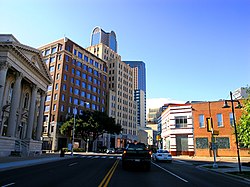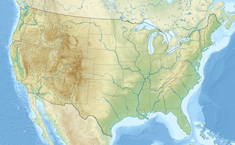The Harwood Street Historic District is a historic commercial district and Dallas Landmark District on the east end of downtown Dallas, Texas lying in parts of the City Center District, Main Street District and Farmers Market District. The locally protected district generally encompasses structures in the blocks fronting Harwood Street from Pacific Avenue to Canton Street.
| Harwood Street Historic District | |
|---|---|
 Harwood Historic District structures | |
| Type | Historic district |
| Location | Along Harwood St. from Canton St. to Pacific Ave., Dallas, Texas |
| Coordinates | 32°46′50″N 96°47′38″W / 32.78056°N 96.79389°W |
| Built | 1888-1955 |
| Architectural style(s) | Italianate, Beaux-Arts, Sullivanesque, Neo-classical, Renaissance Revival, Art Moderne, Art Deco, Modern |
| Governing body | Dallas Landmark Commission |
| Designated | February 28, 1990[1] |
| Reference no. | H/48 |
The district represents a cross-section of Dallas commercial architecture from the 1880s to the 1950s. Styles range from Italianate to Beaux-Arts, Sullivanesque, Neo-classical, Renaissance Revival, Art Moderne, Art Deco and Modern.[2]
History
editAt the turn of the twentieth century, Harwood Street carried merchants and bankers from their mansions in The Cedars to their offices downtown and back home again at night. In the 1920s it was scene shop row, home to the city's vaudeville suppliers.[3]
In 1990 the area was designated a local historic district. Most of the area became part of the larger Dallas Downtown Historic District in 2009.
Contributing Structures
editThe following structures are considered contributing properties of the Harwood Historic District and were constructed over a period of six decades. Many of them have been re-purposed for residential or commercial uses with few alterations to their historical appearance. Others await restoration and are currently vacant.
| Building Name | Address | Constructed |
|---|---|---|
| Hart Furniture Building | 1933 Elm Street | 1888 |
| Dallas Scottish Rite Temple | 500 S. Harwood Street | 1910-1913 |
| First Presbyterian Church | 401 S. Harwood Street | 1912, 1948 |
| Dallas Municipal Building and Annex | 106 S. Harwood Street | 1914, 1954 |
| Majestic Theatre | 1923 Elm Street | 1920 |
| Lone Star Gas Company (south building) | 1915 Wood Street | 1924 |
| Dallas Hilton | 1933 Main Street | 1925 |
| Film Exchange Building | 310-314 S. Harwood Street | 1925 |
| Titche-Goettinger Building | 1900 Elm Street | 1929, 1955 |
| Warner Brothers (Vitagraph) Film Exchange Building | 508 Park Avenue | 1929-1930 |
| Desco Tile Company | 1908 Canton Street | 1930 |
| Lone Star Gas Company (north building) | 301 S. Harwood Street | 1931 |
| Tower Petroleum Building | 1907 Elm Street | 1931 |
| Paramount Pictures Building | 412 S. Harwood Street | 1934 |
| Masonic Temple | 501 S. Harwood Street | 1941 |
| Masonic Relief | 1910 Young Street | 1941 |
| Old Dallas Central Library | 1954 Commerce Street | 1955 |
See also
editReferences
edit- ^ Larry E. Casto (March 31, 2018). "Ordinance No. 30812" (PDF). City of Dallas. Retrieved August 4, 2018.
- ^ "City of Dallas, Texas - Landmark Districts". Archived from the original on 2011-05-04. Retrieved 2011-03-16.
- ^ David Dillon. "HISTORIC HARWOOD STREET - It's a little jewel that gets lost in big-city plans for downtown rejuvenation." The Dallas Morning News 18 Oct. 1988, HOME FINAL, TODAY: 1C. NewsBank. Web. 15 Jan. 2010.

